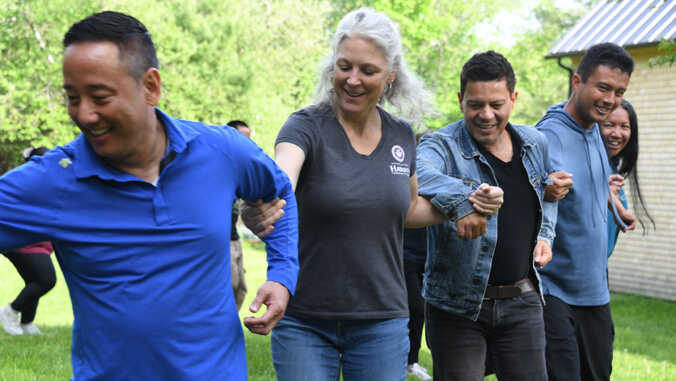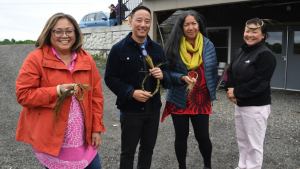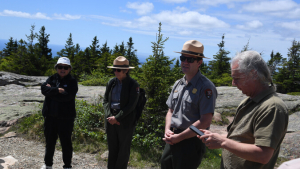
Noʻeau Woo-OʻBrien (Hawaiʻi CC)
Drumming and song, smudging and fire, learning about Indigenous foods, native plants and justice systems, braiding sweetgrass, basket weaving and dancing in a drum circle were just some of the activities for a 22-person delegation from four University of Hawaiʻi campuses through an in-depth cultural exchange program with four Indigenous nations in Maine in May.
The group from Hawaiʻi Community College, UH Hilo, UH Maui College and Kapiʻolani CC included two chancellors and interacted over a week with the four tribes from the Wabanaki Alliance—the Penobscot, Passamaquoddy, Maliseet/Wolastoqey and Mikʻmaq tribes.
Hawaiʻi Pāmaomao

The Hawaiʻi Pāmaomao initiative was conceived by Hawaiʻi CC Professor Taupōuri Tangarō during his first visit to Aotearoa (New Zealand) in 2004. There have been more than two dozen cultural exchanges since 2005.
“Hawaiʻi Pāmaomao is not a topical cultural-tourism experience; rather, it is a rigorous commitment to the learning of one’s Indigenous self and the current conditions of Indigenous peoples; it requires we engage in comparative research of the histories and cultures of the communities we are to experience,” said Tangarō, who is the director for Hawaiian culture and protocols engagement for Hawaiʻi CC and UH Hilo. “Here, everyone on the journey participates in learning to deliver traditional oratory, dances and chants and to conduct cultural workshops appropriate to the communities and ages we visit—no passive participation.”
To the highest mountain

The Hawaiʻi delegation was taken to the top of Cadillac Mountain, the highest mountain on the Atlantic coast. The Penobscot hosts shared about the cultural significance of the area and Wabanaki origin stories.
“[The Wabanaki] cultural forms and ways of life are woven tightly with northern woodlands of pine, spruce, maple, ash, oak; where moose, deer, bear, beavers, woodchucks, hawks, eagles dwell; and where great rivers flow and empty into the ocean at a rugged coastline,” wrote Hawaiʻi CC Professor Drew Kapp, who helped to organize the trip with Assistant Professor Noʻel K. Tagab-Cruz and Hauʻoli Viritua, education specialist and program coordinator for the Nauane grant (to increase the enrollment rates of Native Hawaiian students).
The Hawaiʻi Pāmaomao cohort also interacted with art from Hawaiʻi in closed collections at the Harvard University Peabody Museum, including mahiʻole and ahuʻula (feathered helmets and capes), kiʻi (statuary), hula implements, kapa and more, and honored them through Hawaiian protocol.
Transforming education
Hawaiʻi Pāmaomao does not stop upon returning home.
“The experience will now inform how we see ourselves and our services in academia and the community at large,” Tangarō said. “It provides ongoing self and professional re-actualization as it relates to student success and community wellbeing.”
In 2012, the University of Hawaiʻi and its 10-campus system committed to becoming a leader in Indigenous-serving institutions of higher learning. Fulfilling kuleana (responsibility) to Native Hawaiians and Hawaiʻi is also an imperative of UH’s 2023–29 Strategic Plan.
“Through Hawaiʻi Pāmaomao, we are transforming higher education and, therefore, our communities,” Tangarō said. “Moreover, through Hawaiʻi Pāmaomao, we are transforming ourselves.”
Hawaiʻi Pāmaomao 2024 participants
Hawaiʻi CC
Kimberley Collins, vice chancellor for academic affairs
Yuna Inoue, peer mentor, I Ola Hāloa Center for Hawaiʻi Life Styles, and UH Hilo student
Drew Kapp, assistant professor, geography
Susan Kazama, interim chancellor
Ākeamakamae Kiyuna, assistant professor, Hawaiian studies
Carrie Mospens, dean liberal arts
Tsai-Fen Sarahan, student and peer mentor, I Ola Hāloa Center for Hawaiʻi Life Styles
Chiemi Sasaki, student and peer mentor, I Ola Hāloa Center for Hawaiʻi Life Styles
Noʻel K. Tagab-Cruz, assistant professor, Hawaiian studies, coordinator, I Ola Hāloa Center for Hawaiʻi Life Styles
Taupōuri Tangarō, professor, Hawaiian studies, director, Hawaiian culture and protocols engagement, Hawaiʻi CC and UH Hilo
Hauʻoli Viritua, Nauane program coordinator, I Ola Hāloa Center for Hawaiʻi Life Styles
Noʻeau Woo-Obrien, lecturer, Hawaiian studies
UH Hilo
Maria Andaya, specialist, Kīpuka Native Hawaiian Student Center
Kurt Dela Cruz, senior advisor, Advising Center
Christopher Knudson, associate professor, geography
UH Maui College
Shawna Pabingwit, coordinator, Title IX/EEO-AA
Lorelle Peros, professor, business and hospitality
Joyce Yamada, professor and coordinator, professional development
Kapiʻolani CC
Jennifer Bradley, manager, financial aid
Grant Itomitsu, department chair, culinary arts
Lisa Kanae, department chair, language, linguistics and literature
Misaki Takabayashi, chancellor
—By Kelli Abe Trifonovitch

